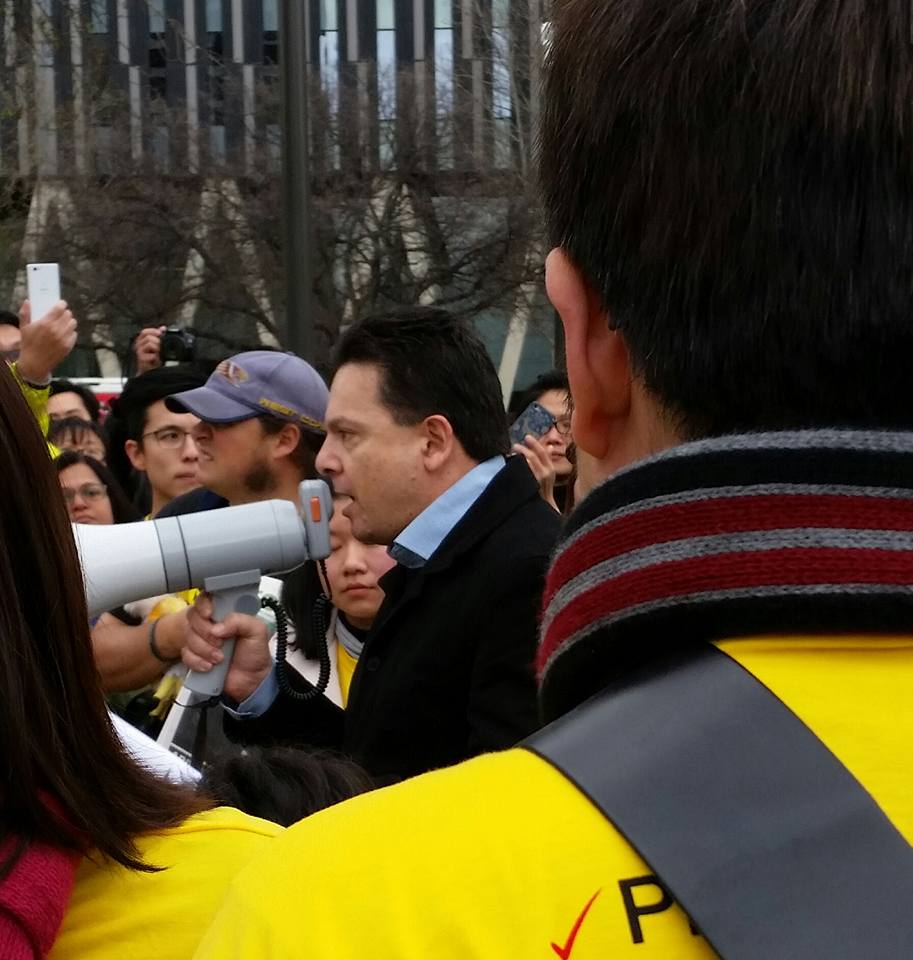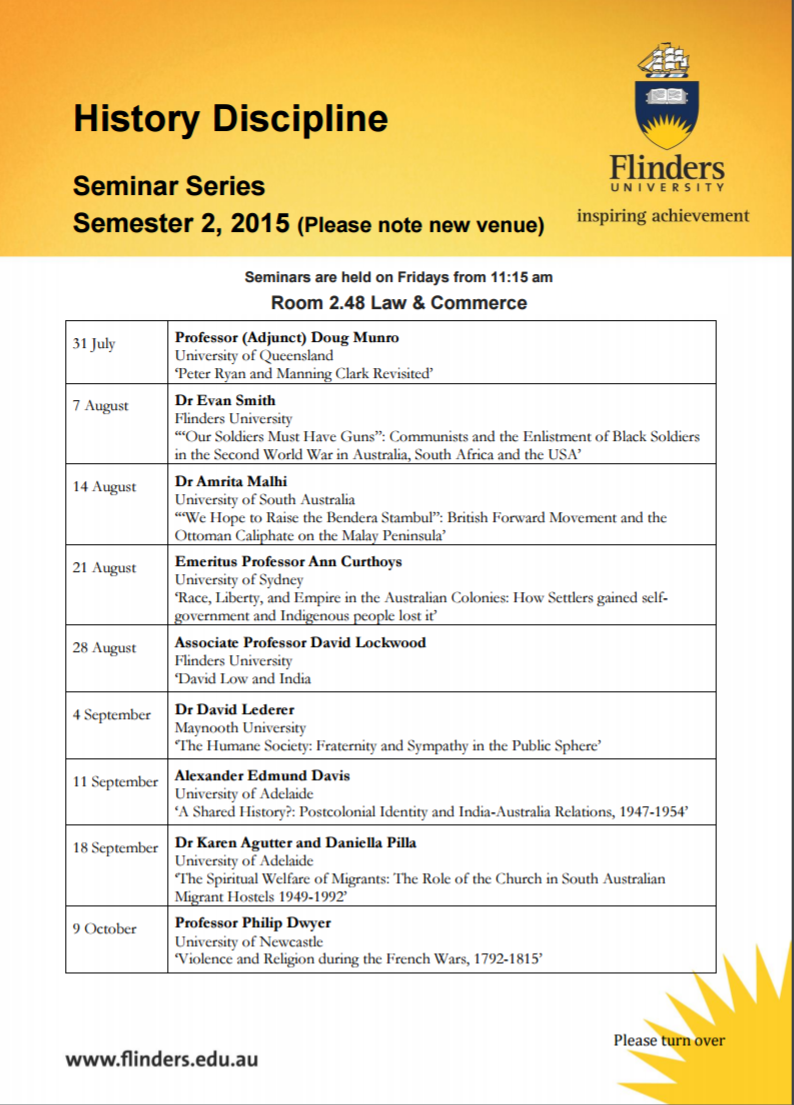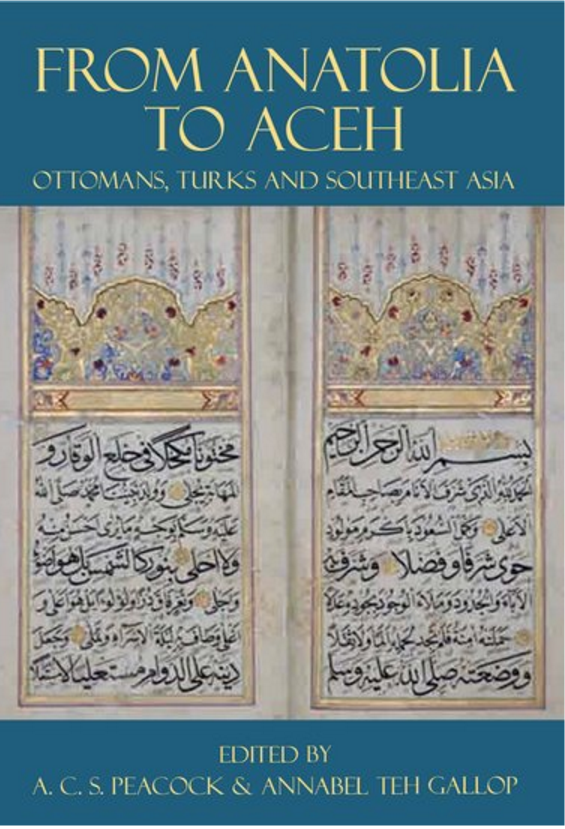I went along to the Bersih rally in Adelaide, where I got this shot of South Australian Senator Nick Xenophon working a megaphone before the crowd. Picture: Amrita Malhi
Senator Xenophon @ Bersih


I went along to the Bersih rally in Adelaide, where I got this shot of South Australian Senator Nick Xenophon working a megaphone before the crowd. Picture: Amrita Malhi

I gave a talk on territorial enclosures and the Caliphate on the Malay Peninsula for the History Seminar Series at Flinders University today. Why? Because they invited me!
My talk focused on the allure the Ottoman Caliphate held for anti-colonial rebels during the British period of forward movement—and the ways in which seemingly-localised uprisings were really aimed at the world system as a whole, as well as at local tactics for privatising land and forests.

Malaysia’s Prime Minister Najib Razak arrives at a presentation for government interns at the Prime Minster’s office in Putrajaya, Malaysia, July 8, 2015. Picture: REUTERS/Olivia Harris
Today, I published an op-ed on The Conversation, focused on making sense of the 1MDB scandal in Malaysia.
Malaysia in turmoil as PM focuses on survival
A serious political crisis is playing out in Malaysia, with no certainty as to when, or whether, it will be resolved. At the heart of this crisis is Prime Minister Najib Razak, who recently shut down an investigation into his financial affairs by the Malaysian Anti-Corruption Commission (MACC).
The investigation had been triggered by allegations in the Wall Street Journal that RM 2.6 billion (US$700 million) had been transferred to Najib’s personal accounts from companies linked to 1Malaysia Development Berhad (1MDB). 1MDB is a state-owned strategic development company that is reportedly RM42 billion (US$11 billion) in debt.

Stock photo representing multiculturalism, selected by The Advertiser.
Today, I hosted a large-scale public discussion event called InterculturAdelaide, focused on policy innovation to better equip Australians to engage with our own diversity, along with that of our Asian neighbours. This is the text of an opinion piece that I published today to accompany the event, in which I argue that Islamophobia in the Australian community can hamper not only social cohesion at home, but also our capacity for genuine Asian engagement.
Engagement with Muslims is an inescapable part of our search for a prosperous future in Asia
IN 1994, Indonesian journalist Ratih Hardjono published her book on Australians, who she pithily referred to as the White Tribe of Asia. Her book traced the history of debates about immigration since the White Australia policy was abolished in the late 1970s.
As Hardjono pointed out, Australia was a nation experiencing burgeoning diversity, and the insecurity that sometimes accompanied that diversity was consistently belied by its advantages on the ground.

Today, the Ninth International Convention of Asia Scholars (ICAS9) closed after 5 huge days of debate and discussion which brought nearly 1,000 Asia scholars from all over the world to Adelaide. The conference has been a great example of how we can all do so much more by creating clever, win-win partnerships, and always building as much community engagement in to our initiatives as possible. Read more

Front cover of program brochure for InterculturAdelaide. Picture: Nazia Ejaz.
Today, I hosted a major public event called InterculturAdelaide. The event introduction that I wrote for the brochure is below, along with my welcome to participants.
Introduction
InterculturAdelaide is a major public policy summit and action research project. It aims to bring together scholars, policymakers and other stakeholders to consider the idea of “interculturality”—broadly defined as a set of cultural skills supporting openness and adaptivity. The day’s proceedings will encompass issues related to Australia’s own diverse population, and to Australia’s international relationships across the Asian region.
Here’s the media release that the University of South Australia wrote to publicise InterculturAdelaide. The University of Adelaide also publicised the event online.
Creating citizens of the world in intercultural Adelaide
June 22 2015
What makes a society operate in peace, harmony and prosperity – luck, goodwill, strategy and legislation, or a combination of factors?
It’s one of many questions to be explored when UniSA’s International Centre for Muslim and non-Muslim Understanding joins with the Government of South Australia and the University of Adelaide to consider the significance of diversity in our community at the InterculturAdelaide summit on July 9.
Summit convenor UniSA’s Dr Amrita Malhi says InterculturAdelaide will offer important opportunities to consider how notions of multiculturalism that emerged in the 1970s and 1980s have evolved.

My chapter appears in this edited volume on interconnections between Ottoman Turkey and Southeast Asia, edited by Andrew Peacock and Annabel Gallop.
Institutions like Singapore’s S. Rajaratnam School of International Studies are beginning to call attention to the likelihood that the Islamic State is consolidating its Southeast Asian networks with terror attacks in mind.
Today, I had a book chapter published which seeks to move beyond the threat-and-response rhythm created by groups like the Islamic State and national governments in our region and around the world. Instead, I’ve worked to show that the allure of the Caliphate in Southeast Asia has a history, indeed one that can be reconstructed from fragments of evidence left behind by the British in Malaya, for example. My chapter analyses when and why Malay Muslims invoked the Ottoman Caliphate in resistance movements against British colonisation on the Malay Peninsula.
The chapter is called ‘We Hope to Raise the “Bendera Stambul”: British Forward Movement and the Ottoman Caliphate on the Malay Peninsula’.

Muslims praying before breaking their Ramadan fast. Stock image selected by the Malay Mail Online. Picture: REUTERS.
My recent op-ed piece in The Conversation was reported in Malaysia today by the Malay Mail Online. In keeping with the Malay Mail‘s interest in Malaysian national affairs, including international assessments of the nation’s political life, it focused on examples I gave to illustrate my point that Muslims themselves debate their own texts. This is an important point in the context of a broader debate around how we should understand Muslim politics, both in Australia and elsewhere, including our close neighbour and important trading partner, Malaysia.
For this reason, I chose examples which demonstrate that there are considerable differences in how Malay Muslims interpret Qur’anic quotes, the way in which these quotes are deployed is shaped by intense political competition in Malaysia. The full text is below, with a link at the end.
Rise in Islamic fundamentalism seen as result of administration unsure of majority support
KUALA LUMPUR, Oct 30 — Growing Islamic fundamentalism in Malaysia reflects an attempt by the ruling administration to reassert moral and political control after a divisive general elections, a political observer from the University of South Australia (UniSA) noted today.
According to an article in independent Australia-based news site The Conversation, the recent spate of enforcement by Islamic authorities may seem “comical”, but it points to an administration unsure of majority support.
“Yet political liberals may not understand that they reflect the Malaysian state’s overriding purpose now: to regenerate Malay Muslim majoritarianism, against strong counter-currents,” wrote Amrita Malhi, a research fellow with UniSA’s International Centre for Muslim and non-Muslim Understanding. Read more

Today, I was interviewed by Stan Grant in the Sky News Studios in Melbourne for the evening current affairs program, Reporting LIVE with Stan Grant. This interview mostly focused on how we should understand Muslim movements and Islamist politics: my argument was that texts alone are not enough, we have to also pay close attention to political and social contexts. Picture: Sky News.